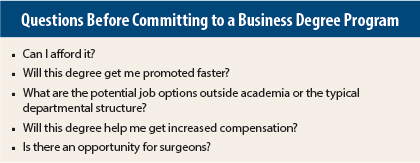Is pursuing a Master of Business Administration (MBA) degree a good idea for ambitious surgical oncologists who want to advance their careers? The ASCO Post recently spoke with Martin J. Heslin, MD, MSHA, Chief, Section of Surgical Oncology, University of Alabama at Birmingham (UAB) Medical Center, about pursuing the degree. Dr. Heslin gave a presentation at the 2014 Society of Surgical Oncology Cancer Symposium titled, “Should I Get a Masters of Business Administration as Part of a Career Development Plan?”
When to Pursue an MBA
Going back to school for a business degree is a big commitment in terms of time and money. How does a doctor know when it’s the right time?
There are a couple of options. A leadership development course is good for a physician at the trainee level; it’s typically shorter and more condensed. If a doctor is still in training, the best approach is to group vacation days together and do the course work through a society. However, if you’re going to do a full executive business program, which is what I focused on, before committing you must be able to dedicate 10 to 15 hours per week. You need to be online and have free time during nights and weekends.
For a practicing surgical oncologist, I think the best time to pursue a business degree is during midcareer. As an assistant professor, you understand the working relationships between doctors and administrators. In other words, you’ve gained the background knowledge to justify working toward the degree and maximizing its benefits.
The Business of Health Care
We tend to think that community oncologists dealing with complex administrative and billing burdens could benefit from pursuing an MBA in order to run a profitable practice. But you make a case for using the degree in academic medicine. Why?
Times have changed. Health care has become a business. Academic medicine used to be shielded from the business side of health care. Physicians on the academic side tended to make less money than those in private practice, and there was more focus on research and education. Generally, the clinical recompense gained if you contracted with a hospital could support your efforts.
Not anymore. It is all about funded-effort reporting now. Either you’re generating revenue from grants or contracts or you’re working with the administrative group figuring out how to save money.
So you need to provide high-quality cancer care while running a profitable, cost-effective institution. The degree can provide the foundational business, financial, and operational knowledge necessary for today’s academic institution challenges.
Surgeon Executives
As an oncologic surgeon with a business leadership degree, do you feel that combining the skill sets of a CEO with an oncologist is the best way for institutions to deliver cost-effective high-quality cancer care?
The short answer is yes. The physician-surgeon CEO model has a couple of advantages. Surgeons are usually fairly decisive people, and a surgeon executive manages a typically difficult group to organize, namely surgeons, who are always disappearing into the OR and consequently rarely available for meetings.
Surgeon executives can also generate revenue in the OR, as long as they can package their time appropriately. And the degree can provide the management tools that may actually improve the level and efficiency of an oncology program.
Given the time an oncologic surgeon spends in the OR, do you see fewer surgeons in MBA programs than other specialties?
The percentage of surgeons in the executive business program compared with medical doctors is quite small. The reason for that is that most centers believe that a surgeon can generate more revenue in the OR than in an executive role.
The adage is that you keep the administrators in the office and the surgeons in the OR. Unless you’re talking about a center’s CEO or other top positions, having surgeons in midlevel administrative positions doesn’t usually make economic sense. That’s one of the reasons that we see so few surgeons in business programs. The trend seems to be changing, however.
Career Path
How does a business degree help your career path?
On a personal level, I’ve found it broadens your knowledge base in topics generally not taught in regular training, such as health-care law, health policy, strategic planning, and so forth. As to whether a business degree will help a doctor get promoted faster, the answer depends on the institution.
If you belong to a pure, hard-core academic institution with an R01 grant–funded mentality, you need multiple grants to be promoted with tenure, so an executive management degree might not have value in your career path. However, if your institution values quality, safety, and business acumen, then the time and money needed for a degree should help accelerate your career.
Please give readers a snapshot of your career and your decision to pursue an executive business degree.
I went to medical school at the State University of New York Health Science Center at Syracuse, New York. I did my residency at New York University Medical Center and spent 4 years at Memorial Sloan Kettering Cancer Center—2 in a clinical fellowship and 2 in a research fellowship. In 1996, I was recruited to UAB, and I relocated with my family to Birmingham, where we’ve lived for the past 18 years.
My old boss told me that opportunity exists for those who are not geographically paralyzed. But remaining at one institution has allowed me to pursue career goals and raise a family at the same time. That said, if you remain at one institution, you need to make sure that you maximize your skills and value in order to advance your career.
Career change happens primarily as a result of crisis or attrition, and neither happens often enough for your career needs. So you need to move horizontally in the medical center, either through administration of the cancer center, as I do, or via management of quality and safety on the hospital side. To advance your career, you need to be fresh, seek new internal opportunities, and meet people you’d never encounter if you stayed in your one little safety zone.
So when I got the executive MSHA, it gave me a way to wear multiple hats and broaden my career as an administrator surgeon. In the end, deciding to pursue a business degree is a highly personal choice. For me, it was certainly worth it.
Medicaid Challenges
To end on a business note, how’s the fiscal health of the UAB Comprehensive Cancer Center?
Our biggest current challenge is Medicaid, because we are in that unenviable position of having a governor who is not expanding the program as an exchange under the Affordable Care Act, and the disproportionate share hospital payments—by which the U.S. government provides funding to treat indigent patients—are going to be lost.
It’s estimated to be an issue on the order of $20 million to $50 million over the next year or two. We have to decide whether to go at-risk for Medicaid ourselves (become our own managed care company) or bring in a for-profit managed care company contracted by the state. But other than that, everything at UAB is great. ■
Disclosure: Dr. Heslin reported no potential conflicts of interest.



